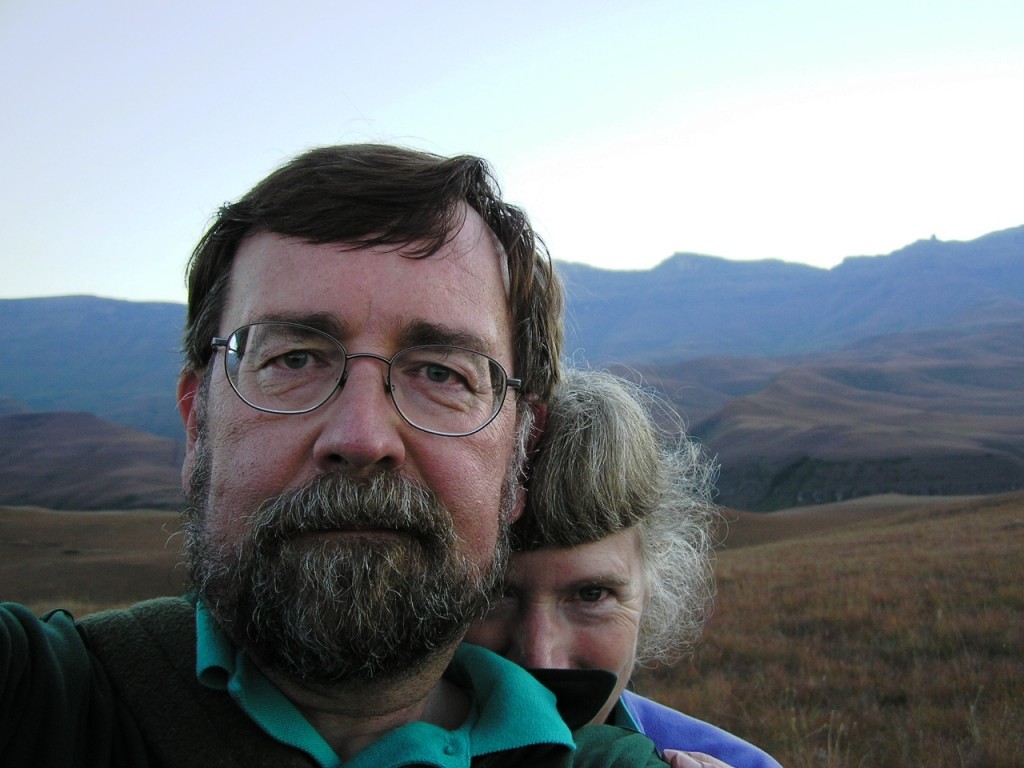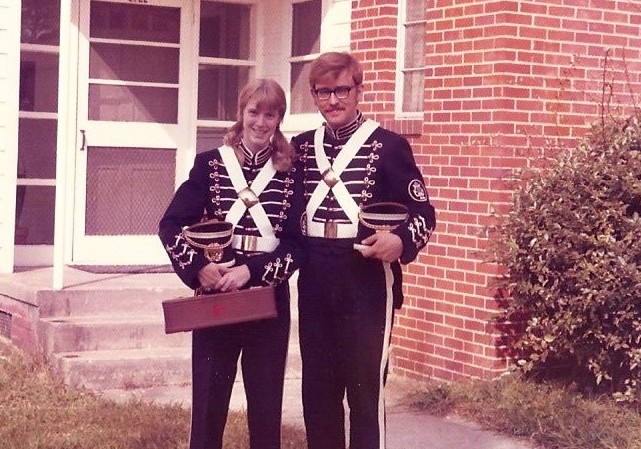
A lifetime of love and memories that started at Wallace Wade
By Audra Ang
Their love story began at a football game with a scream.
The setting was Wallace Wade Stadium on a sunny Saturday, September 19, 1970. Duke was playing Maryland.
Jan Tore Hall, a bespectacled rising sophomore, sat next to Ruthann Huling, a sports-loving freshman with golden blonde hair who was spending her first weekend on campus. The game took an exciting turn and Huling cheered enthusiastically for her team.
“She screamed in my ear. She really did—and LOUDLY,” recalls Hall.
The attraction was immediate and, happily for him, mutual.

Their relationship blossomed quickly. Within three weeks, the pair became “an item.” Hall joined the percussion section of the Duke University Marching Band (DUMB) to be with Huling, a flautist. Huling took summer school to ensure that they graduated at the same time. Once, they got tossed out of the short-order grill in Huling’s dorm for “improper smooching in public,” Hall says. By the end of their junior year, they became the first married couple in DUMB.
“I had a serious, dour, Scandinavian sort of outlook on life. She could be very serious about things but was happy most of the time and deep down, always joyful,” Hall says. “She was also very pretty. I am most blessed even for her to have noticed me that first day.”
The couple graduated with honors in 1973, Hall with a degree in economics and political science and Huling with one in mathematics. During their 40-plus years together, they moved from North Carolina to Connecticut to Tennessee before settling in Massachusetts. They had successful careers—Hall was a lawyer and Huling was an investment actuary—but they felt the need to do more in the world.
After much soul-searching and discussion, Hall and Huling decided to become volunteer missionaries in South Africa. They completed an initial two-year commitment in Durban as administration consultants and outreach assistants before Huling was diagnosed with cancer, requiring surgery and treatment. Still, they planned and worked on a long-term effort to get Massachusetts churches to establish relationships with counterparts in the KwaZulu-Natal region.
They travelled back and forth from 2004 onwards until Huling’s cancer recurred. The couple returned to Durban in 2008 one final time to thank the churches for letting them serve as missionaries.
Huling died in 2012 at age 59. She was at home, holding her husband’s hand.
Later that year, he scattered her ashes in a Durban township where they had worked.
What does Hall miss most about his wife? “Everything. It can’t be otherwise; she was everything to, for, and with me.”
Their memories and shared experiences—at Duke and later in life—are what inspired the couple to include Duke in their will. Their gift will provide support for Libraries’ staff continuing education, scholarships for students from southern Africa, and unrestricted use. Recently, Hall made additional gifts to support Duke Gardens, the Libraries, and the marching band. Each of those gifts is dedicated to the memory of Huling.
Q&A with Jan Tore Hall
How did your time at Duke develop and shape you as a person? Is there something you took away from your education here that has stood you good stead through the years, either personally or professionally?
There’s a real intertwining of the personal and the educational in this.
Besides my life with Ruthann, I’ve carried with me over the years something I learned from a semester in Professor Martin Bronfenbrenner’s course on Marxist economics. That was a particularly striking experience of learning about a system of thought from someone who disagreed fundamentally with its premises but analyzed and critiqued (rather than criticized) its structure and methods with dispassion and respect.
This was an early, very important, instance of my learning the value of considering questions on their own terms rather than from a predetermined set of values or with a particular conclusion in mind.
Why is giving important at a place like Duke? What is the best and/or the most inspiring experience you’ve had here?
Well, the best and most inspiring experience must be meeting Ruthann, mustn’t it? Not perhaps something to go in the promotional literature, but there it is.
Also, the concept of a university as a community extends to those in place and to those who have come from there, so it’s a community across space and time. The benefits to be drawn from that community carry with them a responsibility of participation and support of the enterprise through time.
That duty can come more and less naturally to each of us, but at its best, it would include ‘giving back,’ as we are able.
What’s your favorite place/hangout at Duke?
I’d say the Chapel, and portions of the Gardens, as providers of a sense of place. Experientially, I think of two places that probably don’t exist anymore in the same form: the Rare Book Room, where I worked for three years as a student, and the snack bar in the basement of the old Grad Center dorm (Trent Hall, now, I believe), out of which Ruthann and I were summarily tossed for excessive PDA.
The truth is that Duke constituted the place of origin for Ruthann and me. It is where we met, where we came to know each other, and where we began the time and life together that continued for four decades more. So I suppose that even though we left, and only rarely went back, it’s natural to think on it again, now, in these ways.
Audra Ang is a Senior Development Writer with Duke’s Office of University Development. A previous version of this story originally appeared at Blueprints, the blog of the Duke University Planned Giving Office.

